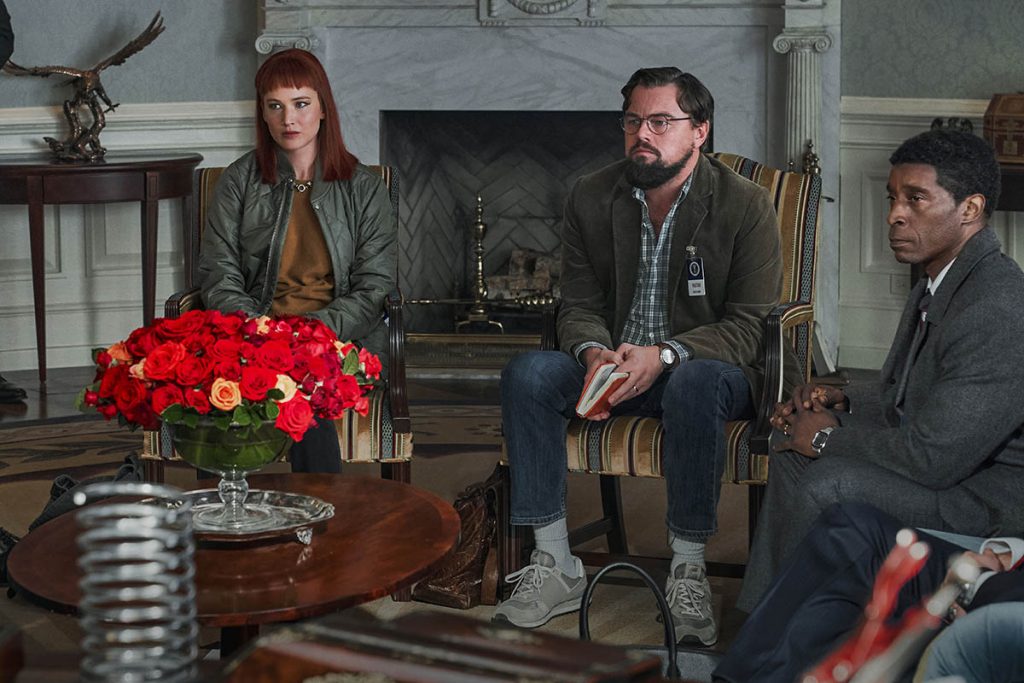Don’t Look Up calls out institutional indifference to impending disaster with relatable and riveting rage thanks to a scorching script and engaged ensemble.
It’s quite fascinating to look back at Adam McKay’s filmography so far. After getting his start in film with the hit TV news satire Anchorman: The Legend of Ron Burgundy – following a six-year stint as a writer on Saturday Night Live – he mostly made comedies for much of the 2000s and 2010s, almost all of which (Talladega Nights: The Legend of Ricky Bobby, Step Brothers, The Other Guys) were staggeringly commercially successful. However, in 2015, despite all the raves he had received as one of our most reliable comedy filmmakers, McKay took the risk to pave a new path for himself in Hollywood with the biographical dramedy The Big Short, playing on his formerly private political passions by revisiting the financial crisis of 2007-2008 to call out those responsible for the U.S. housing bubble that triggered that tragedy.
Still, McKay retained much of his signature sardonic style and withering wit, enlivening what could’ve been boring and blasé biopic with whip-smart writing and energetic editing. And for his endlessly praised efforts, he eventually received the Oscar for Best Adapted Screenplay, prompting McKay to continue with this career progression, premiering the equally piercing Vice just three years later, in which he took former Vice President Dick Cheney to task for his contributions to the decay of the social climate of our country and acquired even more accolades in the process.
Now, with Don’t Look Up, McKay has sought to synthesize his two approaches to storytelling – sidesplitting social satire and acerbic political analysis – with a fictional fable that nevertheless has very real roots in the turmoil of today. When two low-level astronomers, Dr. Randall Mindy (Leonardo DiCaprio, of Titanic and Inception) and grad student Kate Dibiasky (Jennifer Lawrence, of The Hunger Games and Silver Linings Playbook), discover that a meteor will strike the Earth in sixth months, they immediately try and warn the wretchedly prideful president Janie Orlean (Meryl Streep, of Mamma Mia and The Devil Wears Prada), but after being rebuffed by her and her snide son Jason (Jonah Hill, of Superbad and The Wolf of Wall Street) and not taken seriously, they’re forced to take alternative methods to make their message known, embarking on a media tour to warn the world of this impending disaster before it’s too late. Sadly, in addition to squabbling with our egoistical executives, Mindy and Dibiasky face a contemptuous citizenry that doesn’t want to accept the alarming words of these astronomers, resulting in a race against time to change their minds before the meteor makes impact and annihilates all human life as we know it.
First and foremost, the success of Don’t Look Up lies in a factor that was actually outside of McKay’s control – its terrifying timeliness. Initially constructed as a metaphor for climate change (after a conversation McKay had with political journalist David Sirota where the latter compared the crisis to a “comet heading towards Earth that no one cares about”), the picture takes on a new meaning following the American government’s pathetic response to the COVID-19 pandemic throughout much of 2020, during which former President Donald Trump sought to minimize social unrest as much as possible by simply denying science and acting like coronavirus wasn’t as critical a concern as it really was, leading to the loss of hundreds of thousands of lives. It’s impossible not to perceive the parallels between Mindy/Dibiasky and Dr. Anthony Fauci and Orlean and Trump, making the movie feel even more mightily urgent than it would’ve prior to the pandemic.

McKay’s screenplay is practically prophetic and prescient in that way, having correctly called the way our chaotic government – and particularly, members of a certain political party – would respond to such a calamitous sociopolitical catastrophe. Thankfully, we narrowly avoided complete cataclysm, but not without suffering severe casualties along the way. And that’s why the essentiality of Don’t Look Up shows in its willingness to express what will happen if we fail to learn any lessons from our poor handling of these past horrors, which climate change will make look minute in comparison.
What’s most subversive about McKay’s script too is how he resists the urge to pin our country’s problems just on his political adversaries. While some had reservations with his portrayal of Dick Cheney as a master political manipulator responsible for all our current social strife in Vice, such complaints shouldn’t surface here. McKay leaves no stone unturned when it comes to surveying how we’ve all failed to properly address the climate crisis over the course of the 21st Century, rightfully reprimanding the penny-pinching Republicans in power who have prioritized profit over our planet, but also blasting neoliberals who back down from the fight to put politeness and “peace” over the protection of our populace and the common citizens who tune out “bad news” in favor of frivolous topics that make them “feel better” despite the looming doom that is still destined to come their way.
In some way or another, every one of us has contributed to the escalation of climate change, and while McKay does demonstrate the ways we can still attempt to ward off these troubles, he dares to depict the eventual outcome of our disregard, should we continue on this track, and that’s what takes Don’t Look Up to the next level as a social satire. It may start as a semi-playful parody of past and present political figures and their rage-inducing responses to very real issues, but McKay goes the extra mile to really hold our feet to the fire and make us feel the fear formulated by an all-too-plausible future, resulting in a final sequence that deviates from “softer” scenes that have come before, surprising us with his severity but leaving us enraged and energized to make a change.
Though McKay’s lavishly layered script provides his actors with a mighty fine foundation on which to form their performances, his ensemble’s exceptional engagement with the material makes Don’t Look Up as endlessly engrossing as it ultimately is, with each cast member finding a beautiful balance between the broader comedic beats and the darker drama at the core of this social screed. Unsurprisingly, DiCaprio comes out as the MVP, initially appearing as an incredibly amusing (and immensely anxious) astronomer who’s far out of his depth delivering such perilous proclamations to the public before eventually being seduced by the promise of placidity by the “other side” should he play down the problems and refrain from “fear-mongering.”
However, DiCaprio’s Mindy comes to find that he cannot make concrete change working within a corrupt system, and, in a monstrous mid-movie monologue, he lets his rage at the population’s passivity run wild, with the line between actor and character becoming blurred in a manner that’s mesmerizing to behold. It’s moments like these – where the “funny” façade fades away and the truth takes its place – that Don’t Look Up evolves beyond basic entertainment supplemented with social subtext to a cacophonous wake-up call that’s impossible to ignore. It may not be telling us anything we haven’t heard a million times before, but it tells it with such tremendous tenacity that its fervor cannot be forgotten.
And despite DiCaprio’s domination on the acting front due to his deeply impassioned delivery, every actor brings their A-game here, from Lawrence as the eternally displeased Dibiasky, always prepared to put up a fight, to Streep as the perpetually pompous President Orlean, placing her own public perception above the populace’s safety.
Rob Morgan (The Last Black Man in San Francisco, Just Mercy) makes the most of his role as scientist and straight man Dr. Teddy Oglethorpe, grounding the film as its preposterous personalities jockey for power, Mark Rylance (Dunkirk, The Trial of the Chicago 7) earns laughs as the eccentric tech guru Peter Isherwell, whose poorly conceived plans to combat the comet put us all at risk, and cinephiles’ favorite heartthrob Timothée Chalamet (Call Me by Your Name, Dune) charms in a limited capacity as an aimless young adult who strikes up a connection with Lawrence’s Kate at the end of the world and finds solace in her starkness.
However, it’s Cate Blanchett’s (The Lord of the Rings, Thor: Ragnarok) enthusiastically exaggerated news anchor Brie Evantee and Hill’s supremely hilarious “spoiled son” that steal the show amongst the supporting cast, with McKay giving them many of the best comedic moments as they satirize specific media and political stars we know all too well.
With a cast and crew this stacked, it seemed improbable that Don’t Look Up wouldn’t deliver, but ahead of time, it’s unlikely anyone would’ve assumed it’d be this acute an analysis of our current sociopolitical adversity and this emotionally affecting, and such is the brilliance of McKay’s biting script and his gloriously gifted ensemble cast. Though at times it may appear as if you’re being lectured to or fed a message of futility, the film manages to surprise in its sincerely striking final stretch, where, despite all the darkness, it somehow still infuses us with the inspiration to prove him wrong and turn back time to prevent our environmental ills from escalating, making Don’t Look Up not just one of the most monumentally necessary movies of this year, but of this century. And, in the end, we can only pray that McKay’s call to arms fall not on deaf ears.
Don’t Look Up is now available to watch on Netflix.

